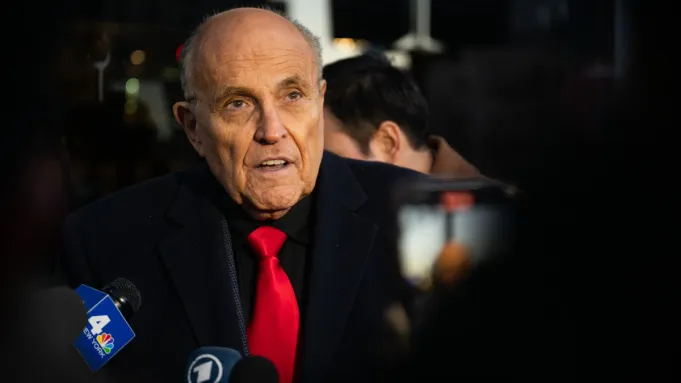Rudy Giuliani Disbarred Over False 2020 Election Claims
Rudolph William Louis Giuliani, once celebrated as "America's Mayor" for his leadership during the 9/11 attacks, now finds himself at the center of a profound legal and political controversy. Giuliani has been disbarred due to his involvement in promoting false claims about the 2020 U.S. Presidential election, a decision that underscores the severe consequences of disseminating misinformation.

Background: Giuliani's Career and Legal Challenges
Giuliani’s career has spanned several decades, marked by significant achievements and equally notable controversies. As the Mayor of New York City, he was lauded for his handling of the aftermath of the September 11 attacks. Before his mayoralty, Giuliani was a successful U.S. Attorney for the Southern District of New York, earning a reputation for his tough stance on crime and corruption.
However, Giuliani’s legacy took a dramatic turn when he became a close ally and personal attorney to President Donald Trump. During and after the 2020 Presidential election, Giuliani became a leading figure in the efforts to challenge the election results. He spearheaded numerous legal challenges and public campaigns alleging widespread voter fraud, despite a lack of substantial evidence to support these claims.
The False Claims and Their Consequences
Giuliani's efforts to overturn the 2020 election results were characterized by a series of lawsuits and public statements that repeatedly claimed voter fraud had tainted the election. These assertions were consistently debunked by courts, election officials, and independent experts. Giuliani's persistence in promoting these unfounded claims not only undermined public trust in the electoral process but also contributed to the political polarization and unrest that culminated in the January 6 Capitol riot.
The legal repercussions of Giuliani's actions were swift and severe. Numerous bar associations and legal experts called for disciplinary action, arguing that Giuliani's conduct violated the ethical standards expected of attorneys. In particular, his repeated assertions of falsehoods, his participation in frivolous lawsuits, and his inflammatory rhetoric were cited as grounds for disbarment.
The Disbarment Process
The disbarment of Rudy Giuliani was a multi-step process that involved a thorough investigation by the relevant legal authorities. The process began with complaints filed by several legal ethics watchdogs and bar associations. These complaints outlined Giuliani’s conduct and argued that his actions merited disbarment.
The investigation focused on several key incidents, including Giuliani’s public statements at press conferences, his appearances in court, and his participation in the infamous “Four Seasons Total Landscaping” press event, where he reiterated baseless claims of voter fraud. The investigation also examined Giuliani’s role in the events leading up to the January 6 insurrection, scrutinizing his speeches and actions that day.
Following the investigation, a disciplinary committee reviewed the findings and determined that Giuliani had indeed violated multiple ethical rules. These included making false statements, engaging in conduct prejudicial to the administration of justice, and using his position to spread misinformation. The committee’s recommendation for disbarment was then reviewed and upheld by a higher authority, leading to the formal disbarment order.
Reactions and Implications
The disbarment of Rudy Giuliani elicited a wide range of reactions from political figures, legal experts, and the public. Supporters of Giuliani and former President Trump decried the decision as politically motivated, arguing that it was an attempt to silence a prominent conservative voice. They contended that Giuliani’s actions were driven by a genuine belief in election irregularities and that his disbarment was an overreach.
Conversely, many legal scholars and political commentators praised the decision, viewing it as a necessary step to uphold the integrity of the legal profession and the electoral process. They argued that Giuliani’s actions had caused significant harm to the nation’s democratic institutions and that holding him accountable was essential to restoring public trust.
The disbarment also had significant implications for Giuliani’s personal and professional life. Legally, he lost the ability to practice law, which was a major blow to his career. Politically, his reputation suffered a severe hit, diminishing his influence within the Republican Party and among conservative circles.
Broader Implications for Legal Ethics and Political Accountability
The disbarment of Rudy Giuliani highlights broader issues related to legal ethics and political accountability. It underscores the importance of maintaining ethical standards within the legal profession, particularly when attorneys hold influential public positions. The case serves as a reminder that lawyers are bound by a duty to the truth and to the proper administration of justice, and that violations of these duties can result in severe consequences.
Additionally, the decision reflects a growing recognition of the dangers posed by misinformation, especially when disseminated by individuals in positions of power. Giuliani’s actions demonstrated how false claims could undermine democratic processes, erode public trust, and incite violence. The response to his conduct signals a commitment to countering misinformation and protecting the integrity of democratic institutions.
The Future of Rudy Giuliani
In the wake of his disbarment, Rudy Giuliani faces an uncertain future. Legally, he may pursue avenues to appeal the disbarment decision, although the success of such efforts remains uncertain. Professionally, Giuliani will likely explore other opportunities outside of practicing law, potentially focusing on media appearances, writing, or consulting.
Politically, Giuliani's influence is expected to wane, although he may continue to play a role within certain conservative circles. His steadfast support for Donald Trump and his involvement in the 2020 election challenges have solidified his position among Trump loyalists, but his broader appeal has diminished significantly.
The disbarment of Rudy Giuliani marks a significant moment in the intersection of law, politics, and ethics. It serves as a powerful reminder of the responsibilities borne by those in positions of influence and the potential consequences of failing to uphold those responsibilities. As the nation continues to grapple with the aftermath of the 2020 election and its repercussions, the case of Rudy Giuliani stands as a testament to the importance of truth, integrity, and accountability in public life.
This decision not only affects Giuliani personally but also sends a broader message about the standards expected of legal professionals and the imperative to protect democratic processes from misinformation and manipulation. As the country moves forward, the lessons from Giuliani’s disbarment will undoubtedly continue to resonate in discussions about legal ethics, political accountability, and the preservation of democratic norms.


You must be logged in to post a comment.